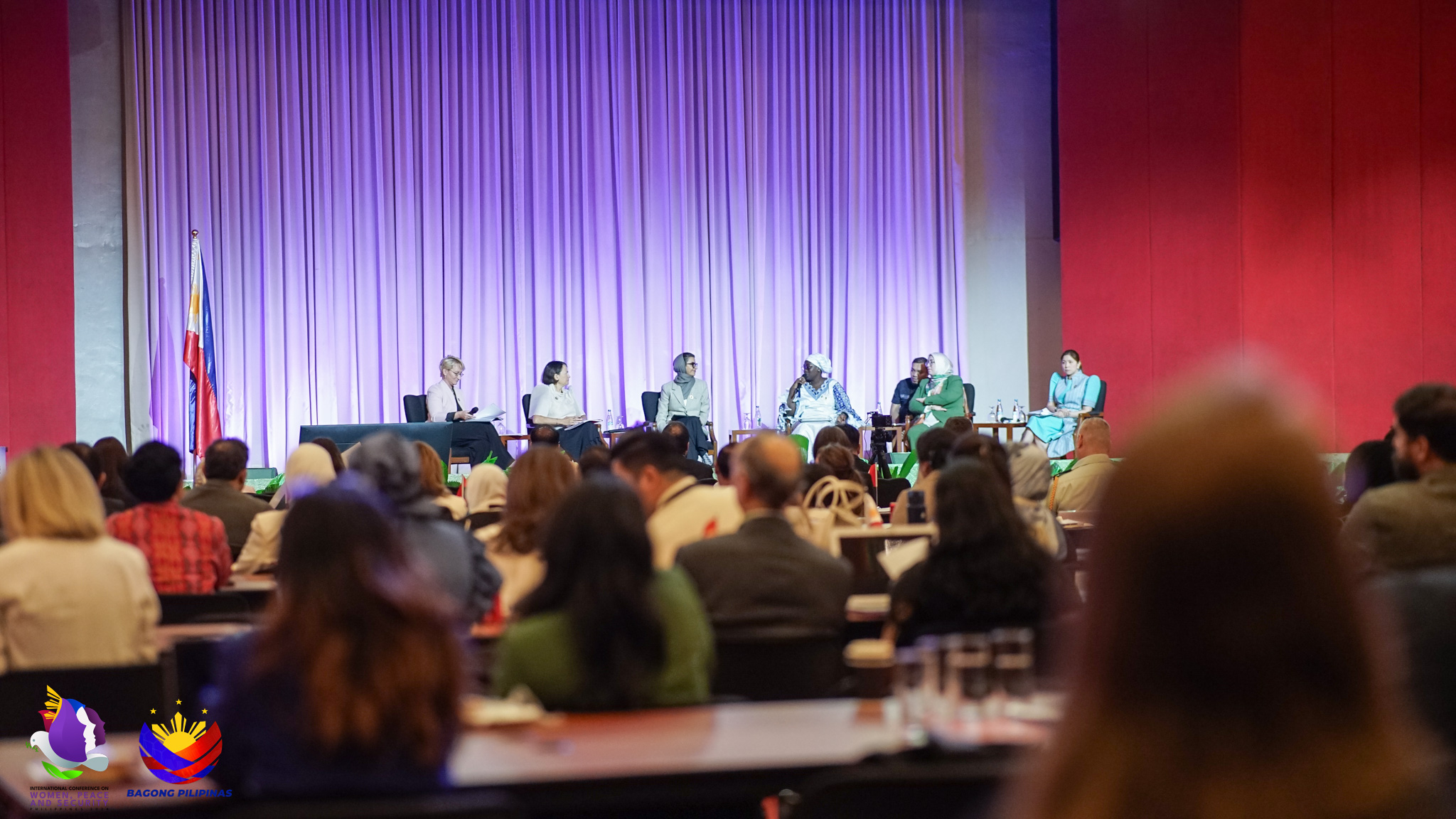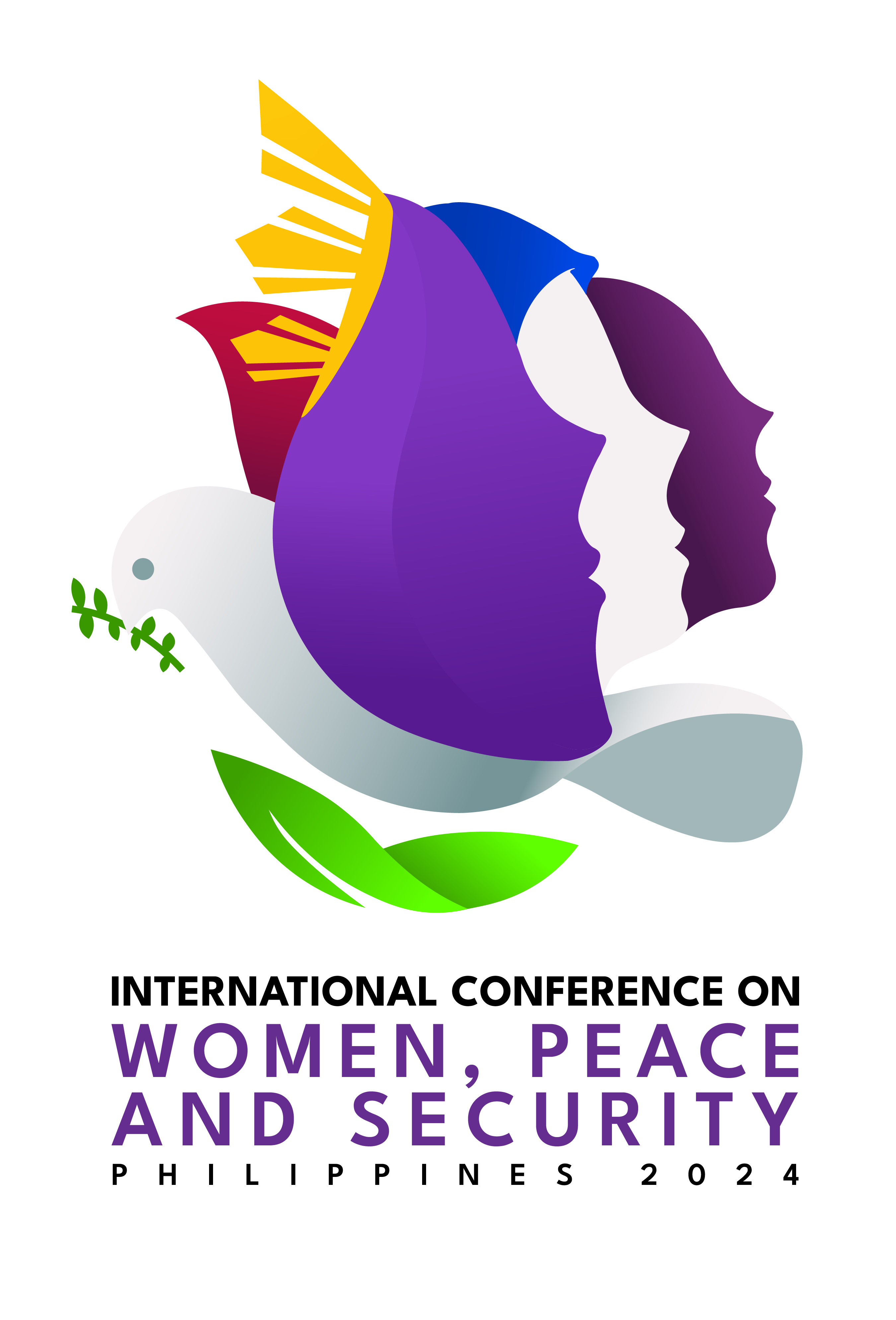Women leaders convene to discuss implementation of WPS strategies

MANILA – Top women ministers and policymakers from around the globe convened here on Monday, October 28, at the International Conference on Women, Peace, and Security to review the progress, share best practices, and chart the path forward in the implementation of the Women, Peace, and Security (WPS) agenda.
The high-level panel discussion on “Implementing Actionable Women, Peace, and Security Strategies and other Practical Measures” brought together an esteemed group of women leaders who included H.E. Coulibaly Mariam Maiga, Minister of Women, Children and Family of Mali; H.E. Noura bint Mohammed Al Kaabi, Minister of State at the Ministry of Foreign Affairs of the United Arab Emirates (UAE); Hon. Amenah F. Pangandaman, Secretary of Budget and Management of the Republic of the Philippines; Her Excellency Catherine West, Parliamentary Under-Secretary of State for the Foreign, Commonwealth and Development Affairs of the United Kingdom; and H.E. Huria K.M. Eltarmal, Minister of State for Women’s Affairs of Libya.
The meeting, moderated by H.E. Dace Melbārde, Parliamentary Secretary of the Ministry of Foreign Affairs of Latvia, provided panelists the opportunity to share their countries’ innovative strategies and initiatives to implement the United Nations Security Council 1325 on Women, Peace, and Security, highlighting both progress made and challenges that remain.
Mali’s National Gender Policy
Minister Maiga of Mali discussed her country’s adoption of the National Gender Policy in 2010, which is in line with numerous ratified international, sub-regional and national conventions, including United Nations Security Council Resolution (UNSCR)1325.
“The authorities and people of Mali have undertaken a genuine, inclusive and participatory approach of all social, professional and political lawyers, and of all national and diaspora communities,” Maiga said.
She shared that Mali has already adopted the fourth generation of its National Action Plan (NAPWPS), which ensures women’s increased participation in peace and reconciliation processes, including the empowerment of 355 women peace ambassadors who play crucial roles in conflict prevention and management.
UAE: Pioneering NAPWPS in the Gulf region
Meanwhile, UAE’s Minister Mohammed Al Khabi cited her country’s pioneering interventions as the first Gulf Cooperation Council member to launch a NAPWPS, as well as implement regional and international initiatives to enhance women’s roles in military and peacekeeping operations.
“Our efforts go beyond our national borders. We [are] involved in supporting the agenda regionally and internationally. Therefore, we are keen to host activities and launch initiatives that aim at promoting the WPS agenda,” Al Khabi emphasized.
Philippines’ gender-responsive budgeting
Secretary Amenah F. Pangandaman, Budget and Management chief of the Republic of the Philippines, shared her government’s comprehensive approach to gender-responsive budgeting, including a legal mandate that requires at least 5% of government budgets to be allocated for women’s empowerment programs.
Pangandaman also highlighted the Philippine government’s efforts to improve compliance across agencies and integrate gender perspectives into the country’s public financial management systems.
“We have introduced just a month ago a new road map. This is the Public Financial Management Roadmap 2025 to 2028…we call it PFM+++. The first plus is climate. The second plus is disaster, and the third plus is gender. We are now working on this platform to improve the compliance of our gender budget to our [national] budget,” she explained
Pangandaman also underscored the key contributions of Filipino women in promoting the Small and Medium-sized Enterprises or SMEs sector in the Philippines.
UK: Financial commitment to WPS important
UK’s Undersecretary Catherine West discussed her country’s financial commitments to support the women, peace and security agenda globally, particularly through its Preventing Sexual Violence in Conflict Initiative and partnerships with civil society organizations.
“The important thing for countries like the UK is to maintain our financial commitment. We have a commitment of £33 million partnership with the Equality Fund to bring forward the next generation of women,” West said
She added that since 2022, the UK has invested £60 million as part of its efforts to prevent sexual violence, particularly in situations of conflict which she emphasized affects women disproportionately.
Libyan women and peace efforts
Meanwhile Libyan Minister of State for Women’s Affairs Huria K.M. Eltarmal discussed her country’s initiatives to enable women’s participation in peace and social stability-building efforts, such as the establishment of specialized courts and offices that support women.
“This participation of Libya reflects the faith of the national government of National Unity of Libya in the effective role that a woman that the Libyan woman can play in promoting peace and stability in the country, especially after the many experiences that the women lived under under conflicts that Libya has faced in the last years,” shared Eltarmal.
“Over more than two decades, we have seen great progress, and there are many evidences from countries that women’s participation in peace negotiations, mediation, and conflict resolution has increased. So have the gender perspective in peacekeeping operations,” said H.E. Dace Melbārde, who chaired the session.
“However, despite the achievements, much more remains to be done, improvements,” Malbarde emphasized.
The panelists also underscored the importance of engaging more men as allies, challenging harmful gender norms, and ensuring adequate and sustainable funding to advance the WPS agenda.
The second day of the International Conference on Women, Peace and Security will feature discussions and exhibits showcasing the work of women leaders and peacebuilders.
The ICWPS was organized by the DFA in cooperation with the Office of the Presidential Adviser on Peace, Reconciliation and Unity, Department of Budget and Management, Philippine Commission on Women, the Philippine Center for Islam and Democracy, and UN Women, with the support of Senator Loren Legarda.

